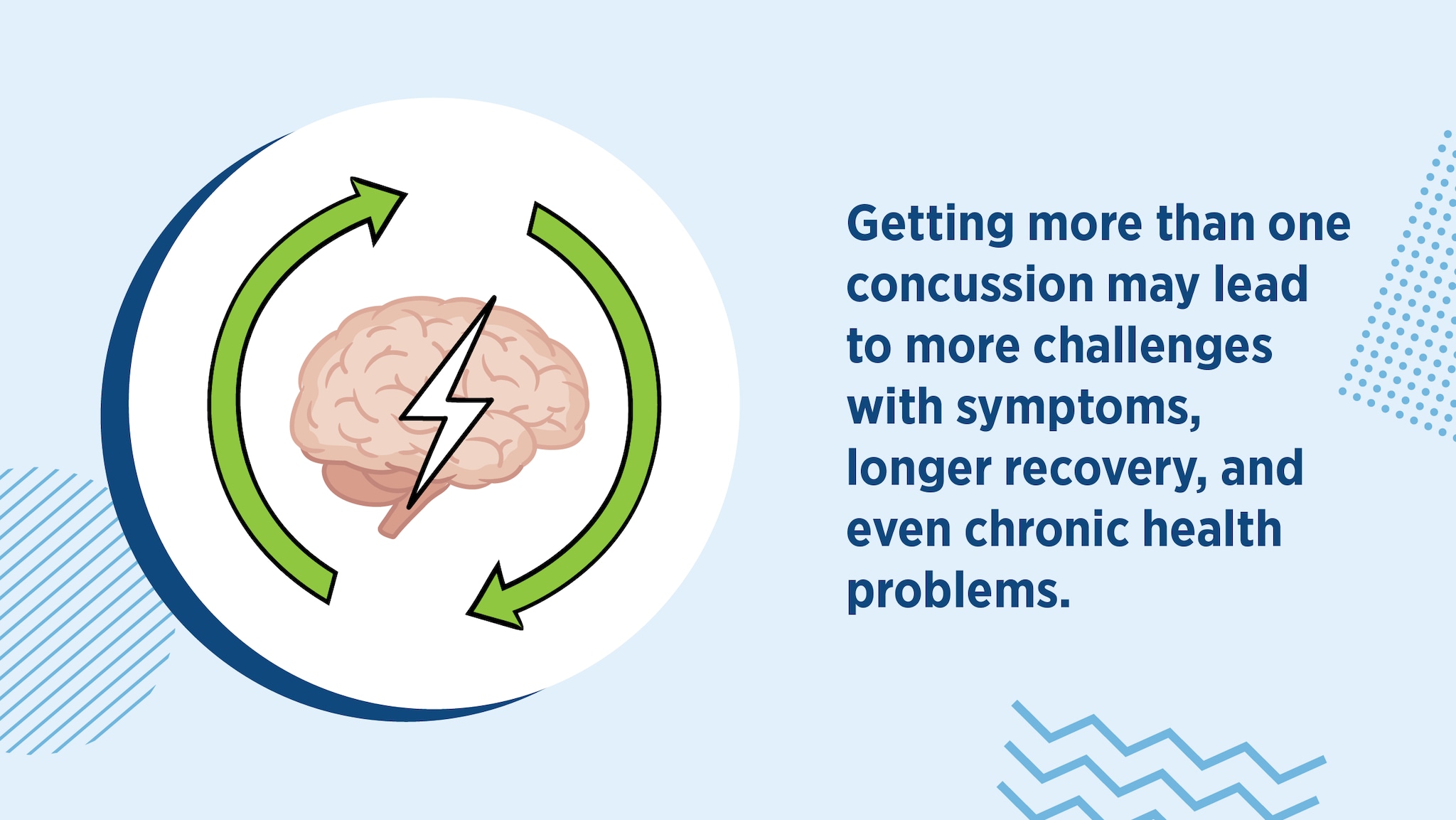Key points
- A concussion is a type of traumatic brain injury.
- The effects of a concussion can be serious.
- A child with a concussion needs to be seen by a health care provider.
Concussions are brain injuries
A concussion is a type of traumatic brain injury—or TBI—caused by a bump, blow, or jolt to the head or by a hit to the body that causes the head and brain to move rapidly back and forth.
This sudden movement can cause the brain to bounce around or twist in the skull, creating chemical changes in the brain and sometimes stretching and damaging brain cells.1 These changes in the brain lead to symptoms that may affect how a child thinks, learns, feels, acts, and sleeps.2 Symptoms are usually most severe right after the injury.3 Learn more about the signs and symptoms of concussion.
Concussions should be taken seriously because they can produce changes in your child's brain, body, and behavior.2 Most children with a concussion feel better within 2 to 4 weeks.345 However, some children have symptoms that effect their behavior, mood, memory, or emotions for months or longer.67 Symptoms that stay around can affect children as they grow up and even through adulthood.2
Concussion symptoms can make it hard to do regular activities at home and school. Having a history of previous concussions or experiencing more severe symptoms right after the concussion increases the chance that a child will have a longer recovery.8 A child with multiple concussions also has a greater chance of experiencing chronic health problems later on.8
Get medical care for a concussion
You might feel anxious, afraid, or uncertain if you think your child may have experienced a concussion. These feelings are normal. You can play an active role in your child's recovery by getting them checked by a health care provider. Health care providers have treatments to help. And getting care from a health care provider can help speed your child's recovery. Learn more about what do if you think your child has a concussion.
See the Where to Get Help webpage if you need help finding a health care provider.
Try to avoid repeat head impacts and concussions

Exposure to repeated head impacts increases the chance for concussions and other TBIs, as well as the potential for changes in the brain and brain diseases.9101112 There's a bigger risk of more serious and longer-lasting symptoms when a child has multiple concussions.413 This is especially true when there's not enough healing time between injuries.
A child with a history of multiple concussions also may have:
What you can do
There are several things you can do to help prevent concussions.
- Explore concussion signs and symptoms and know what to watch for if your child experiences a bump, blow, or jolt to the head.
- Learn more about what to do after a concussion, including instructions and recovery tips.
- Get information on moderate or severe brain injury that may lead to long-term or life-long health problems.
- View data on TBIs among children during sports and recreation activities.
- See the Where to Get Help webpage to find support and medical care in your community.
- Giza CC, Hovda DA. The new neurometabolic cascade of concussion. Neurosurgery. 2014;75(suppl_4):S24-S33.
- Centers for Disease Control and Prevention. Report to Congress: The Management of Traumatic Brain Injury in Children. 2018.
- Eisenberg MA, Meehan WP, 3rd, Mannix R. Duration and course of post-concussive symptoms. Pediatrics. Jun 2014;133(6):999-1006. doi:10.1542/peds.2014-0158
- Eisenberg MA, Andrea J, Meehan W, Mannix R. Time interval between concussions and symptom duration. Pediatrics. Jul 2013;132(1):8-17. doi:10.1542/peds.2013-0432
- Barlow KM, Crawford S, Stevenson A, Sandhu SS, Belanger F, Dewey D. Epidemiology of postconcussion syndrome in pediatric mild traumatic brain injury. Pediatrics. 2010;126(2):e374-e381.
- van Ierssel J, Ledoux AA, Tang K, et al. Symptom Burden, School Function, and Physical Activity One Year Following Pediatric Concussion. J Pediatr. Jan 2021;228:190-198.e3. doi:10.1016/j.jpeds.2020.08.061
- Rivara FP, Koepsell TD, Wang J, et al. Disability 3, 12, and 24 Months After Traumatic Brain Injury Among Children and Adolescents. Pediatrics. 2011;128(5):e1129-e1138. doi:10.1542/peds.2011-0840
- Babikian T, Merkley T, Savage RC, Giza CC, Levin H. Chronic Aspects of Pediatric Traumatic Brain Injury: Review of the Literature. J Neurotrauma. Dec 1 2015;32(23):1849-60. doi:10.1089/neu.2015.3971
- Alosco M, Kasimis A, Stamm J, et al. Age of first exposure to American football and long-term neuropsychiatric and cognitive outcomes. Translational psychiatry. 2017;7(9)
- Mez J, Daneshvar DH, Kiernan PT, et al. Clinicopathological Evaluation of Chronic Traumatic Encephalopathy in Players of American Football. JAMA. 2017;318(4):360-370. doi:10.1001/jama.2017.8334
- Swartz EE, Register-Mihalik JK, Broglio SP, et al. National Athletic Trainers' Association Position Statement: Reducing Intentional Head-First Contact Behavior in American Football Players. J Athl Train. Feb 1 2022;57(2):113-124. doi:10.4085/1062-6050-0062.21
- Montenigro PH, Alosco ML, Martin BM, et al. Cumulative Head Impact Exposure Predicts Later-Life Depression, Apathy, Executive Dysfunction, and Cognitive Impairment in Former High School and College Football Players. J Neurotrauma. Jan 15 2017;34(2):328-340. doi:10.1089/neu.2016.4413
- Covassin T, Moran R, Wilhelm K. Concussion symptoms and neurocognitive performance of high school and college athletes who incur multiple concussions. Am J Sports Med. Dec 2013;41(12):2885-9. doi:10.1177/0363546513499230
- Centers for Disease Control and Prevention. Report to Congress on Traumatic Brain Injury in the United States: Epidemiology and Rehabilitation. National Center for Injury Prevention and Control; Division of Unintentional Injury Prevention. Accessed June 15, 2022, https://stacks.cdc.gov/view/cdc/29215
- Ledoux A-A, Webster RJ, Clarke AE, et al. Risk of Mental Health Problems in Children and Youths Following Concussion. JAMA Network Open. 2022;5(3):e221235-e221235.
- Emery CA, Barlow KM, Brooks BL, et al. A Systematic Review of Psychiatric, Psychological, and Behavioural Outcomes following Mild Traumatic Brain Injury in Children and Adolescents. Can J Psychiatry. May 2016;61(5):259-69. doi:10.1177/0706743716643741
